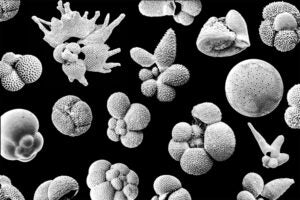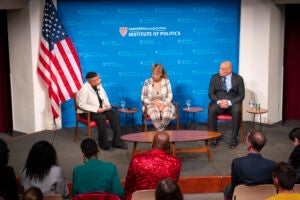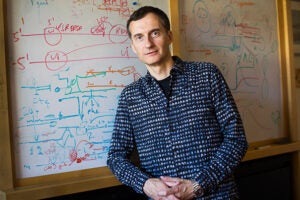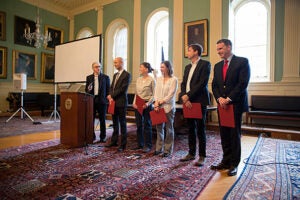Tag: Science
-
Nation & World
A sun-bright future in Allston
With its development plans approved by the city of Boston, Harvard is moving ahead on its plans to create state-of-the-art facilities for the School of Engineering and Applied Sciences and other centers of innovation.

-
Nation & World
Hawking at Harvard
Acclaimed theoretical physicist and cosmologist Stephen Hawking discussed the mysterious qualities of black holes during his lecture at a packed Sanders Theatre.
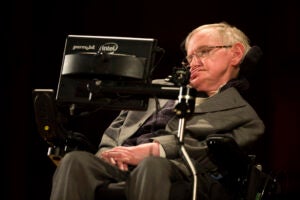
-
Nation & World
Study that undercut psych research got it wrong
A study last year claiming that more than half of all psychology studies cannot be replicated turns out to be wrong. Harvard researchers have discovered that the study contains several statistical and methodological mistakes, and that when these are corrected, the study actually shows that the replication rate in psychology is quite high.
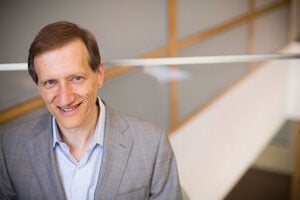
-
Nation & World
Study of African trees goes public
A postdoctoral fellow has launched a citizen-science project that aims to digitize thousands of pages of detailed observations on the life cycles of African trees.
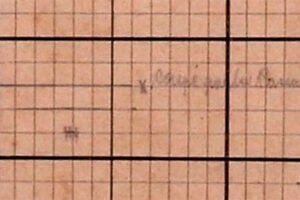
-
Nation & World
Harvard hosting HUBweek
As one of four sponsors, Harvard will be a major player in HUBweek, hosting 18 presentations celebrating Boston area innovation.
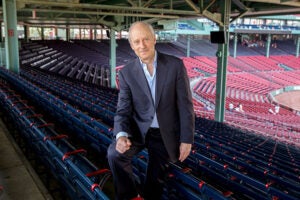
-
Nation & World
A quantum leap for women
Step by step, a growing Harvard women’s student group is helping to change the male-dominated culture of computer science by creating fresh realities.

-
Nation & World
March mammal madness
An assistant professor of evolutionary biology, Katie Hinde is also the creator of Mammal March Madness, a tournament that emulates the college basketball playoffs and pits species against each other in simulated combat.
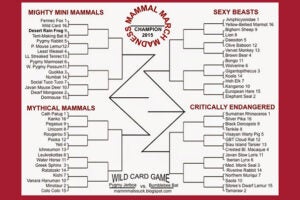
-
Nation & World
Discovering ‘detectives’ of science
Howard Stone returned to Harvard to lead the annual holiday lecture at the School of Engineering and Applied Sciences, with hundreds of family and community members in attendance.
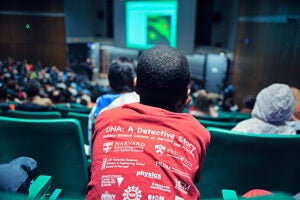
-
Nation & World
Andrew Murray named an HHMI professor
Professor Andrew Murray was named a Howard Hughes Medical Institute professor and will receive $1 million in funding for innovation in undergraduate science education.
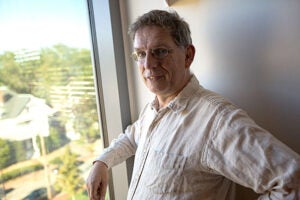
-
Nation & World
‘Fight Church’ raises some questions
Can you love your neighbor as you punch him in the face? That’s one question posed by “Fight Church,” a documentary that will be screened on Monday during an event hosted by the Science, Religion, and Culture Program at Harvard Divinity School.
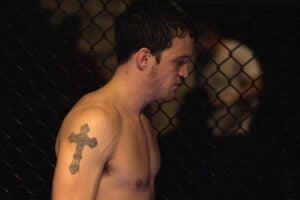
-
Nation & World
The biologist in charge
Beetle biologist Brian Farrell is taking the reins of the David Rockefeller Center for Latin American Studies, with an eye toward increasing collaboration between Harvard scientists and those at institutions in the region. The center will also get a new executive director, Ned Strong, former director of the Chilean office.
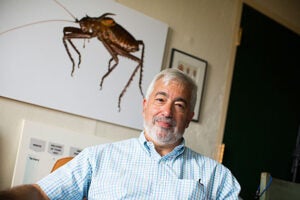
-
Nation & World
James Newton Butler
At a Meeting of the Faculty of Arts and Sciences on October 1, 2013, the Minute honoring the life and service of the late James Newton Butler, Gordon McKay Professor of Applied Chemistry, Emeritus, was placed upon the records. Professor Butler was acclaimed for his research on ionic equilibrium and pelagic tar in the North…
-
Nation & World
Support on the cutting edge
Supporter James A. Star ’83 was on hand at a ceremony to honor the inaugural winners in the Star Family Challenge for Promising Scientific Research.
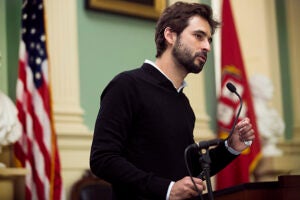
-
Nation & World
Beyond the horizon
Harvard is immersed in understanding the world and improving it. Here’s how the University is making a difference now, and likely will do so in the next decade, in five key fields.
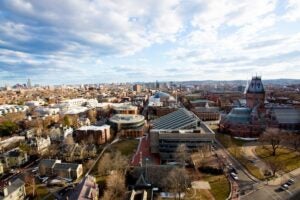
-
Nation & World
Kovac makes a ‘Big Bang’ on Time’s list
Time magazine has named John Kovac to the 2014 Time 100, its list of the 100 most influential people in the world.
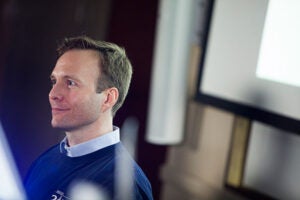
-
Nation & World
William Cromie, Gazette science writer, dies at 84
William J. Cromie, a longtime Harvard Gazette science writer who retired in 2007 after 18 years of writing about the latest scientific findings out of Harvard laboratories and field research, has died at his home in Somerville, Mass., at age 84.
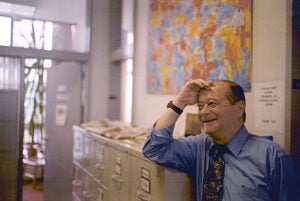
-
Nation & World
A faith in global care
Harvard University Professor Paul Farmer, whose nonprofit Partners In Health has improved lives in some of the world’s poorest places, said he was inspired early by the liberation theology movement.
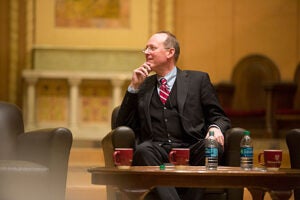
-
Nation & World
As complex as a toy
Radcliffe Fellow Tadashi Tokieda is creating and using simple toys whose sometimes surprising behavior both illustrates scientific concepts and causes even experienced scientists to scratch their heads trying to figure out what’s happening.
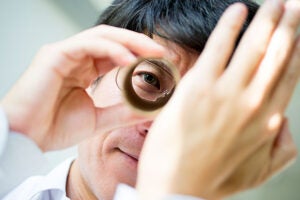
-
Nation & World
Top-notch teachers
Edo Berger, the John L. Loeb Associate Professor of the Natural Sciences, and Anne Pringle, an associate professor of organismic and evolutionary biology, have been named the recipients of the 2013 Fannie Cox Prize for Excellence in Science Teaching.
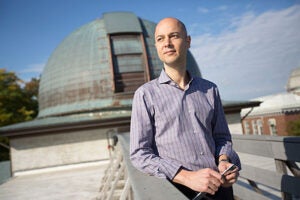
-
Nation & World
Programming genetic code can lead to better designer genes
The key to programming bacteria to follow orders has been found in its protein production. Researchers have learned that by using more rare words, or codons, near the start of a gene, they can remove roadblocks to protein production. The knowledge may mean new drugs and biofuels.
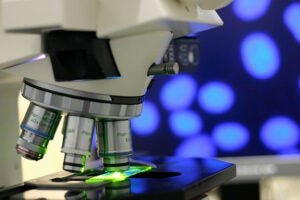
-
Nation & World
Transparent artificial muscle plays music
Using a gel-based audio speaker, Harvard researchers have shown that electrical charges carried by ions, rather than electrons, can be put to meaningful use in fast-moving, high-voltage devices.
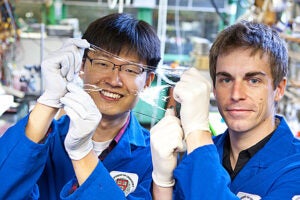
-
Nation & World
Hyman to lead Society for Neuroscience
Steven E. Hyman, former provost and Distinguished Service Professor of Stem Cell and Regenerative Biology at Harvard, has been named president-elect of the Society for Neuroscience, the world’s largest organization of brain and nervous system scientists and physicians.
-
Nation & World
Speaking up for science
Former National Ocean and Atmospheric Administration administrator Jane Lubchenco described her four years in Washington, D.C., as difficult and frustrating, but said it’s imperative that other scientists follow suit to give science a voice in national policies.
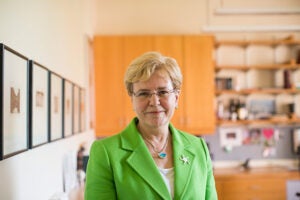
-
Nation & World
Understanding student weaknesses
As part of an unusual study that surveyed 181 middle school physical science teachers and nearly 10,000 students, researchers found that the most successful teachers were those who knew what students would get wrong on standardized tests.
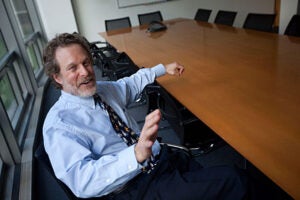
-
Nation & World
$50M gift from the Blavatnik Family Foundation
The Blavatnik Family Foundation, headed by Len Blavatnik, M.B.A. ’89, has donated $50 million to Harvard University. The gift will launch a major initiative to expedite the development of basic science discoveries into new breakthrough therapies for patients and cures for disease. The gift underpins Harvard’s growing commitment to creating an entrepreneurial culture in the…
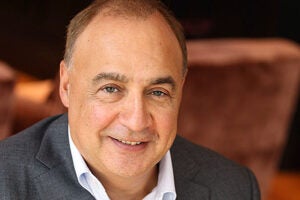
-
Nation & World
One gene, many mutations
In a new paper, Harvard researchers show that changes in coat color in mice are the result not of a single mutation, but of many mutations, all in a single gene. The results start to answer one of the fundamental questions about evolution: Does it proceed by huge leaps — single mutations that result in…
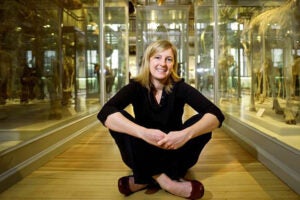
-
Nation & World
Cantor: Fund medical research
U.S. Rep. Eric I. Cantor, the House majority leader, embraced immigration reform, education changes, and medical research funding during a speech at the Harvard Kennedy School.
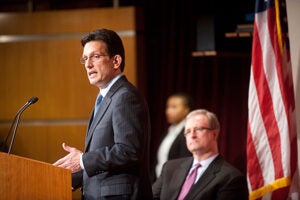
-
Nation & World
Using explosions to power soft robots
Using small explosions produced by a mix of methane and oxygen, researchers at Harvard have designed a soft robot that can leap as much as a foot in the air.

